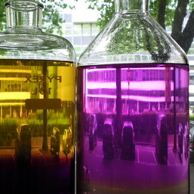Talk:Mod:jyn111cnjg
1.1 Part 1 (45%)
1.1.1 Formation and Hydrogenation of Cyclopentadiene Dimer (10/10%)
Nice work, both the results and the discussion are correct, the text is very neat, indwell done supporting all the arguments presented with literature. (10/10%)
1.1.2 Atropisomerism in an Intermediate related to the Synthesis of Taxol (10/10%)
Well done modelling all the different configurations for both compounds, you could have added the energy summary of the twist boat conformations in the table too. (5/5%) Also well done modeling the parent hydrocarbons to support your statement about the hyperstability of the alkenes. (5/5%)
1.1.3 Taxol NMR - Spectroscopic Simulation using Quantum Mechanics (20/25%)
How do you know that the structures you modeled are the ones with the lowest energy? Do you think there may be more possible configurations? (3/5%)
Well done calculating the spectra and comparing them with literature values, you could have calculate the deviation from literature and plot this to identify the most significant deviations. (17/20)
1.2 Part 2 (55%)
1.2.1 The Crystal Structures of the Shi Catalyst and the Jacobsen Catalyst (5/5%)
Well done finding the structures and discussing the relevant parameters.
1.2.2 The Calculated NMR Properties of the Epoxides (3.5/5%)
Good work calculating the spectra and comparing them with literature values. Also, you could have analyze the deviation of the calculated from literature values to obtain a better description of the discrepancies. (3.5/5)
1.2.3 The Assignment of the Absolute Configurations for Alkenes 2 and 4 (35/35%)
Well done with the calculation of the OR, your calculated OR are very close to the literature values! (15/15%)
Well done calculating the enantiomeric excess for the compounds, and comparing them with published results. (20/20%)
1.2.4 NCI and QTAIM Analysis for the Transition State (6/6%)
Well done with the analysis of the non covalent interactions and nice discussion about them.
1.2.6 New Candidates (3/4)
Good suggestion. Also you could have comment some of the physical properties that you can study with these methods.
General Comments: Great work!
